The images of wads of banknotes stunned the world. A year ago, on December 9th 2022, detectives from the Belgian police's national anti-corruption unit seized 878,355 euros in cash at the home of the Greek vice-president of the European Parliament Eva Kaili and her Italian partner Francesco Giorgi, a Parliamentary assistant.
After Giorgi's initial arrest, Eva Kaili had made a hurried attempt to exfiltrate most of the money, stuffing 720,000 euros in 50 euros notes into a suitcase, along with nappies and a baby’s bottle, and then entrusting the bag to her father, who had been in Brussels to spend time with his 21-month-old granddaughter.
But police had been watching the household, seized the suitcase and searched the couple's Brussels apartment. Here they they found an additional 157,555 euros in cash, most of it stashed in two travel bags (see photo below). Eva Kaili, a member of the European Parliament's Socialists and Democrats (S&D) group, was arrested, along with Antonio Panzeri, a former Italian S&D MEP, for whom Giorgi had worked as an assistant. Detectives later found 669,950 euros in cash at Panzeri's home.
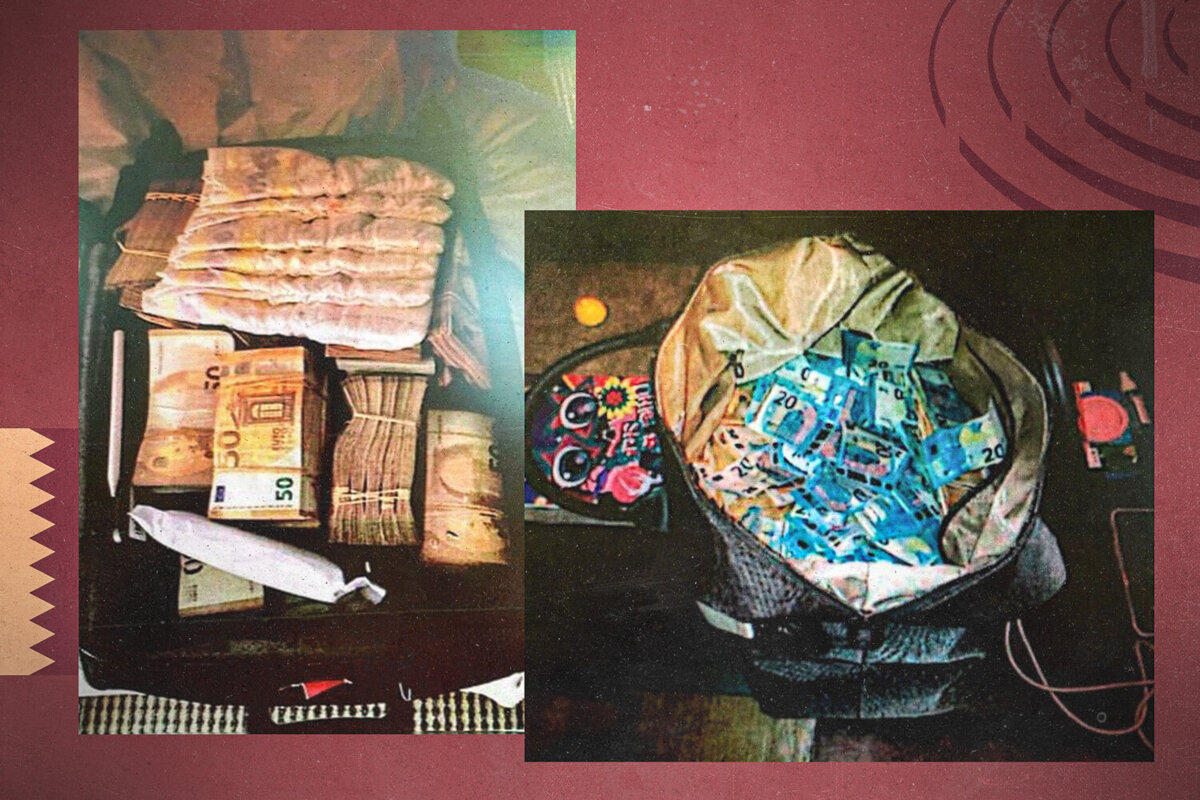
Enlargement : Illustration 1

Shortly afterwards, all three were placed under investigation for “corruption”, “money laundering” and participation in a “criminal organization”. It was the beginning of the “Qatargate” affair, a scandal which sent unprecedented shockwaves through the European Union.
Antonio Panzeri, who was subsequently granted the status of 'repenti' – a suspect who agrees to cooperate with an investigation in exchange for a reduced sentence - and Francesco Giorgi quickly confessed: they had been carrying out secret lobbying, even corruption, inside European Union institutions on behalf of Qatar, Morocco and Mauritania, in return for hundreds of thousands of euros. Panzeri accused Eva Kaili of having received 250,000 euros in cash following an alleged corruption pact with Qatari officials in early 2019. She strongly denies this.
The MEP, stripped of her vice-presidency and thrown out of her political group, then spent four months in custody. Following her release, Eva Kaili has protested her innocence in the press. She told the anti-corruption detectives that she had not been aware of anything: neither the foreign origin of the cash stored at her home (she said it belonged to Panzeri), nor of the influence operations carried out by her companion.
But after a year of investigation, the Belgian justice system has gathered a great deal of information which contradicts Eva Kaili's defence and, in the words of a report by detectives, “confirms her place in the Panzeri/Giorgi/Kaili criminal organization”. This is revealed in an investigation by Mediapart and its partners in the European Investigative Collaborations (EIC) network, based on many legal documents from the case obtained by the Belgian daily newspaper Le Soir.
There is, for example, a message from Eva Kaili in November 2020 in which she describes Francesco Giorgi as a “trusted consultant for several governments” - a sign that she was aware of his parallel activities. “From what I know, his only activity is the European Parliament”, she told the EIC.
One of her own former Parliamentary assistants told detectives that on Middle East issues Eva Kaili was guided by her partner. “For everything concerning the Gulf states she used to ask me to ask Francesco Giorgi's opinion, and we had to follow his instructions … Giorgi used to come into the office three or four times day … Once when Giorgi was not there Kaili phoned him in my presence to find out what she had to say, do or vote.”
“I follow nobody's instructions”, Kaili told the EIC.
Belgian investigators have been able to uncover an incredible influence operation: Eva Kaili carried out frantic lobbying in a bid to get a visa waiver for Qataris. The messages on her phone appear to show that she was following the directives of Panzeri and Giorgi, in close connection with very high level Qatari officials, including the foreign minister at the time (and now prime minister) Mohammed bin Abdulrahman al-Thani and labour minister Dr Ali bin Samikh al-Marri. Contacted by the EIC, they did not respond.

Enlargement : Illustration 3

These messages also reveal the murky role played by several other high-level European figures, and also by the boss of world football's governing body FIFA, Gianni Infantino, and by the head of the French Football Federation (FFF) Noël La Graët.
Eva Kaili denied to both investigators and the EIC that she had been guided remotely. She said she had simply followed the “EU's official policy” and that she had acted solely out of political conviction and in the interests of European citizens.
Antonio Panzeri's lawyer Marc Uyttendaele refused to comment because of the confidential nature of the investigation. Francesco Giorgi's legal advisor did not respond to requests for a comment.
1. The 'Greek Connection' and Commissioner Avramopoulos
The story begins in 2018, right at the start of the collaboration between Antonio Panzeri, who was then chair of the human rights sub-committee at the European Parliament, his Parliamentary assistant Francesco Giorgi, and their new client Dr Ali al-Marri, the current labour minister in Qatar who was then president of his country's National Human Rights Committee (NHRC) and the man behind the alleged corruption and cash payments.
At the end of 2018 al-Marri sent his first order to Panzeri: to get the European Union to grant Qatari citizens the right to travel in the Schengen zone without a visa. For Qatar this was an issue of prestige and honour: the only country from the Gulf that had this status was one of its greatest enemies, the United Arab Emirates, which since 2017 had been carrying out a blockade (since lifted) of Qatar along with Saudi Arabia. Qatar wanted to put that right.
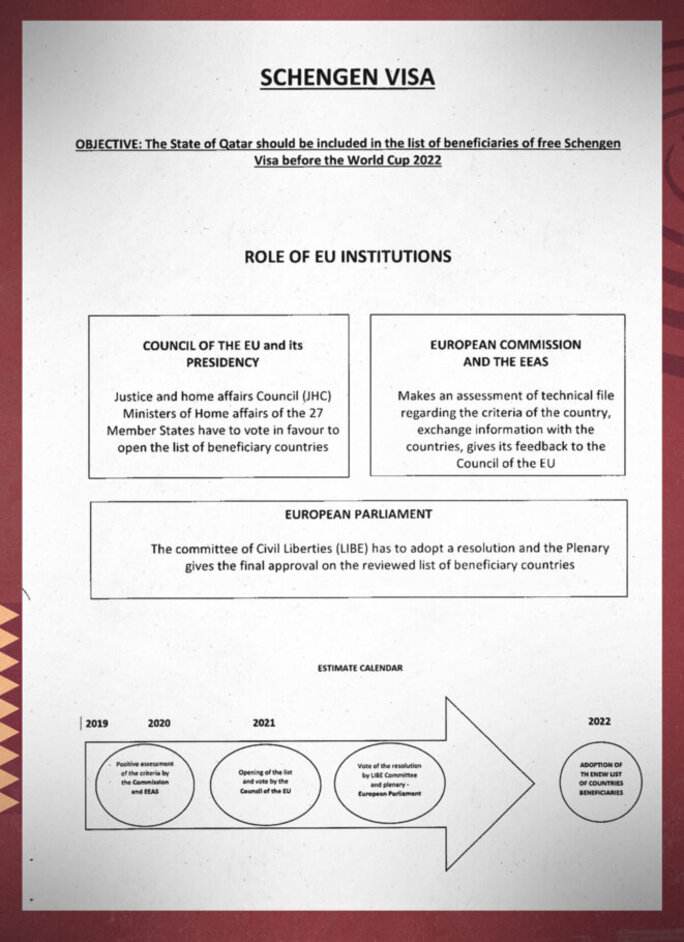
Enlargement : Illustration 4

In several reports to his Qatari client Francesco Giorgi described the operation in detail, including meetings with the figures to be influenced. An “action plan” drawn up in 2020 indicates that the “objective” was to obtain the visa waiver “before the 2022 World Cup” .
Giorgi explained to the Qataris that they had to target Greece, because when it came to visas “mainly Greeks are in key positions” in the “EU decision-making process”. According to a police summary of the evidence, to achieve their mission, Panzeri and Giorgi needed to call on a “Greek connection”, made up of Eva Kaili, the current vice-president of the European Commission Margaritis Schinas, as well as a key man: Dimitris Avramopoulos, who until 2019 was the commissioner for migration, and therefore responsible for visas.
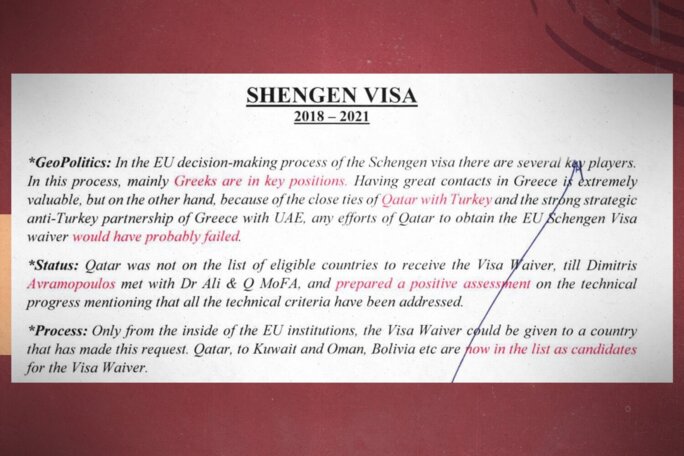
Enlargement : Illustration 5

At the time Qatar's request could not even be considered by the European Commission, in particular because of the human rights situation.
This problem was swiftly resolved, however. The two lobbyists first arranged a meeting between Dimitris Avramopoulos and Ali al-Marri on March 12th 2019 in Strasbourg and then another encounter with the Qatari foreign minister Mohammed al-Thani in New York on September 26th 2019.
According to a report written by Giorgi, “Qatar was removed from the blacklist” by the Commission a few weeks later, thanks to a “positive report” written by Dimitris Avramopoulos.
On October 29th 2019 the Qatari foreign minister sent the young Italian a warm letter of thanks. “I would like to reiterate my sincere appreciation for your understanding of Qatar's challenges and your readiness to advise our government especially with regards to Qatar's inclusion to the Schengen visa-free list,” the minister wrote.
Asked by the EIC, the Commission declined to comment about the positive report that Avramopoulos was said to have written. “There is no such thing as a 'black list' of countries that cannot be considered for visa waivers,” said a spokesperson for the Commission.
In December 2019 Dimitris Avramopoulos left the European Commission. Antonio Panzeri, who had himself just lost his position as an MEP, seems to have immediately convinced the former commissioner to work on his behalf. Eva Kaili told detectives that from the start of 2020 “Panzeri wanted to put Avramopoulos in Fight Impunity”, his non-governmental organisation (NGO) which served as a facade for his influence operations, and which was suspected of being covertly funded by Qatar.
Everything seems to have been decided in February 2020 during an all-expenses-paid trip to Doha for a conference on social media networks financed by Dr Ali al-Marri. Among Dr al-Marri's guests were Kaili and Avramopoulos, the Belgian MEP Marc Tarabella (who is today being investigated as part of the Qatargate case) plus Panzeri and Giorgi. It was Parliamentary assistant Giorgi who made the arrangements, from a visit to the country's stadia to dinners at the luxury restaurant Yasmine Palace.
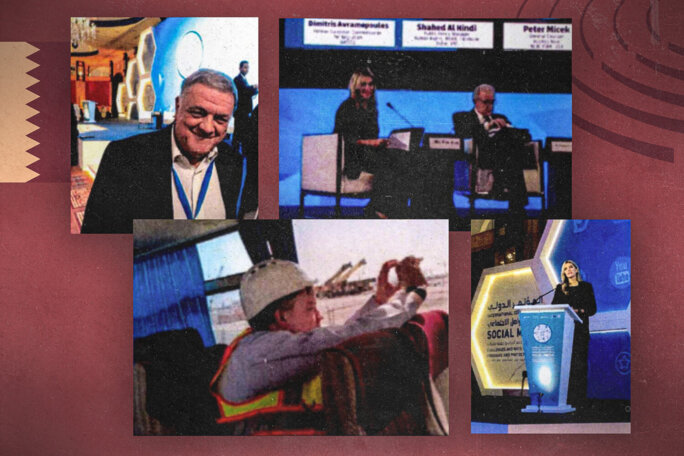
Enlargement : Illustration 6

Dimitris Avramopoulos had barely returned from Doha when he began lobbying on the visas. The aim was to convince his Swedish successor, the new commissioner for migration Ylva Johansson. To boost Qatar's chances of success, Panzeri and Giorgi came up with a strategy: to suggest a “package” deal with two other Gulf states “Kuwait and Oman”.
On February 20th 2020 Qatari foreign minister Mohammed al-Thani wrote to Avramopoulos saying that he had a problem with “the Swedish”.
“I have some ideas. We have to talk,” replied the former commissioner, who also forwarded the exchange to Eva Kaili.
On March 3rd 2020, Avramopoulos informed the MEP that he would meet Ylva Johansson 48 hours later. On the day of the meeting, Eva Kaili reminded him what he should ask for: “Kuwait Oman Qatar package” . “Done,” replied Avramopoulos.
“This is not called lobbying. This is called politics”, Kaili said to the EIC. “If we believe something is beneficial for citizens, we should do it.”
A spokesperson for Ylva Johansson said her talk with Avramopoulos was just a “courtesy meeting”, and that they did not discuss the visas proposal.
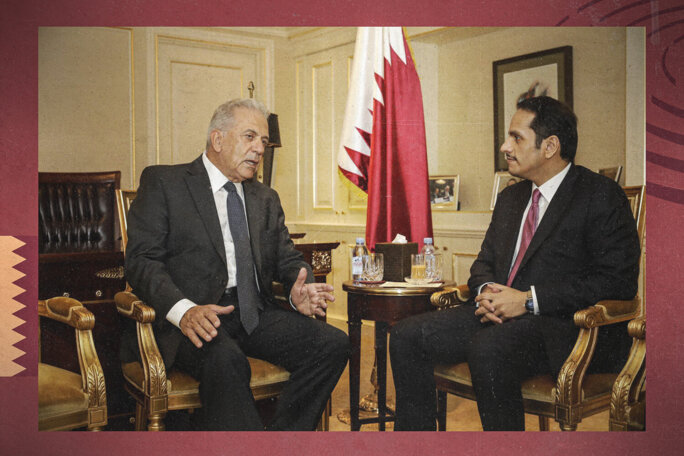
Enlargement : Illustration 7

This episode raises even more questions concerning Avramopoulos for, like all former commissioners, he was banned from lobbying the Commission for a two-year period after his departure.
Was Avramopoulos recompensed for this? In February 2021, once the Commission had approved his hiring by Fight Impunity, Avramopoulos became the only paid administrator at Antonio Panzeri's NGO. He received around 5,000 euros gross a month from February 2021 to February 2022. This was despite the fact that, as Fight Impunity's secretary told detectives, he “didn't do a lot”.
Contacted by the EIC, Dimitris Avramopoulos refused to comment on the case itself and threatened us with legal action. He said he had “nothing to do” with the story and had “acted in strict compliance with the European Union's rules, following European policy and procedures”.
2. Eva Kaili's magic letters
At the start of October 2020 Francesco Giorgi wrote a document for the attention of Belgian MEP Marc Tarabella. It was a battle plan for the next meeting of DARP, the European Parliament's Delegation for Relations with the Arab Peninsula. “During the debate Eva will propose the appointment of a European MP who will be in charge of overseeing the issue of visas in the [EU] institutions and you'll state your availability,” he wrote.
“I am not controlled remotely,” replied Eva Kaili when detectives showed her this document, stating that her partner had simply given her some “advice”.
In a document prepared as part of his defence, Francesco Giorgio wrote that the plan was not carried out in the end because the chair of DARB had handed responsibility for visas to Tarabella of her own accord. Tarabella's lawyer also says that the MEP “was in no way guided by the duo of Panzeri and Giorgio” and that he had received neither money nor gifts.
The activities of Panzeri and Giorgio continued during 2020 and 2021. According to their reports Eva Kaili lobbied Dimitri Giotakos, Head of EU Visa Policy at the Commission about the Qatari visas. Panzeri and Giorgio also mention meetings with Greek ministers and the prime minister Kyriakos Mitsotakis which would make it possible to “remove any resistance from Greece”.
But after three years of lobbying the Commission had still not given the go-ahead.
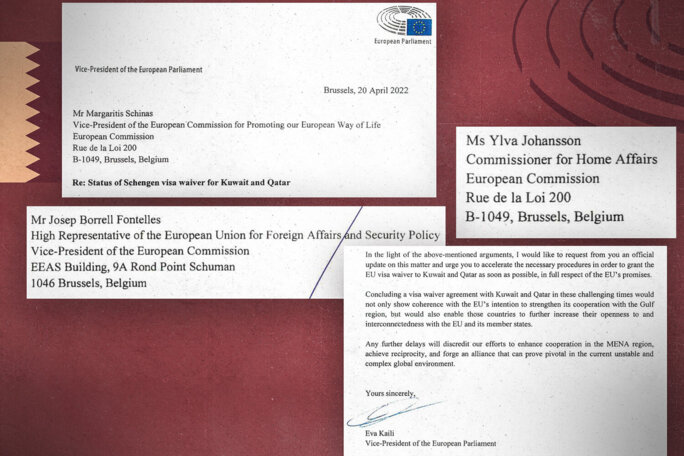
Enlargement : Illustration 8

On April 22nd 2022 Eva Kaili, who was by now vice-president of the European Parliament, threw all her weight behind the effort. She sent the same email to three key men in the Commission: the High Representative for Foreign Affairs Josep Borrell, the Commissioner for Home Affairs Ylva Johansson, and Johansson's superior, the Greek Vice-President of the Commission Margaritis Schinas. “I urge you to speed up the necessary procedures in order to grant EU visa waivers to Kuwait and Qatar as soon as possible,” Eva Kaili wrote to them.
In a letter written by her partner Giorgi to Qatar, he claimed that these three letters from Kaili were part of the lobbying activities carried out by him and Panzeri on behalf of the Emirate.
A week later the proposed visa exemption for Kuwait and Qatar was adopted by the European Commission. Asked by the EIC, the three recipients said that Eva Kaili’s letters “did not influence the Commission’s decision in any way. At that time, the proposal was already concluded and undergoing the standard adoption process.”
The European Council, which represents the member states, gave its approval at the end of June 2022. All that remained was to convince the MEPs.
3. European Parliament president Metsola's holiday
Eva Kaili had been elected as vice-president of the European Parliament in January 2022. Three days later, on January 25th, she messaged the Maltese president of the Parliament Roberta Metsola via WhatsApp asking for particular special responsibilities as part of her role (human rights and the Middle East) which, noted Belgian detectives in a report, were “linked to the strategies of the Panzeri/Giorgi organisation”. Kaili wrote to Metsola: “I don’t have conflicts or controversial statements.”
Eva Kaili did indeed become the Parliament president's representative for activities linked to the Middle East, making her a vital figure in that region. And she thanked Roberta Metsola warmly. “I hope I didn't make it difficult for you. You gave me everything I loved the most!” she wrote.
When questioned by detectives, Eva Kaili said that in April 2022 Roberta Metsola had also given her responsibility for visa issues. This is denied by the Parliament president's spokesperson who said that “the president did not appoint Madame Kaili” to that position.
Eva Kaili's charm offensive stepped up a gear in August 2022, when she seems to have helped organise the president of the European Parliament's holiday in Greece. “In four days I will let you know the details for Athens,” she wrote to her on August 1st . “Super, looking forward,” replied Metsola.
“You, your husband and 4 boys? Or more? Tickets and a guide will wait for you at 18:00 Acropolis museum,” Eva Kaili wrote to Metsola on August 8th. She also laid on a dinner for Metsola, five people close to her and her two security details at a “top restaurant” stating: “Nothing for you to take care of, just send me the number of people”.
“Everything was incredible. Thank you,” Roberta Metsola wrote to Kaili a few days later.
Approached by the EIC, the European Parliament president said via a spokesperson that she was keen to have “excellent relations” with MEPs and so it was “not unusual” to have “private discussions on the issue of private holidays”.
On October 31st and November 1st 2022 Eva Kaili made a quick visit to Qatar and Kuwait where there was a lot of discussion about the visa waiver project. In Doha she met with Dr Ali al-Marri, who was now transport minister, and the foreign affairs minister Mohammed al-Thani. “The Prime Minister sent me a gift from FIFA. Either we thank them, or we thank them during the future vote,” Eva Kaili wrote to the EU ambassador to Qatar.
According to what she told detectives, it was during this trip that Eva Kaili first met Gianni Infantino, president of FIFA and organiser of the football World Cup in Qatar.
Eleven days later, Eva Kaili sent an invitation to attend the World Cup to Roberta Metsola's chief of staff, who politely declined. “Hi Eva, Roberta consulted with the legal service and we have to be very careful […]. So, without prejudice to the future, for the time being I would not do it...” he replied.
This did not deter Eva Kaili from making the same proposal the next day to Roberta Metsola herself. “ My dear President! Hope you are well, I have to pass you an invitation for the World Cup, you or your husband and boys might be interested?” Roberta Metsola told the EIC that she turned down the invitation.
Questioned by investigators, Eva Kaili that that it had been Gianni Infantino who provided her with these invitations. “FIFA and its president never offer gifts via third parties,” a spokesperson for FIFA told the EIC, denying the claim.
4. A meeting in suite 412
After the Commission and the European Council had given the go-ahead over the Qatar visa waiver, Giorgi and Panzeri now had to focus their lobbying on the European Parliament. On November 9th 2022 the two men drew up a list of four MEPs who had influence over the issue and whom Eva Kaili had to meet.
But the following day Antonio Panzeri, who had clearly gone to the Parliament himself, noted that Kaili had spoken to a “Dutch” MEP who did not feature in their plan. He called Giorgi to pass on instructions. “Your girlfriend … has gone over the top ... It might be an appropriate time to tell her to stop.”
When questioned by detectives, Eva Kaili denied that she had been under the pair's orders. She regarded Panzeri's comment simply as “misplaced humour”.
Meanwhile there was a more important matter to hand: on November 14th the Qatari labour minister Dr Ali al-Marri, Panzeri's and Giorgio's client, was due to address the European Parliament.
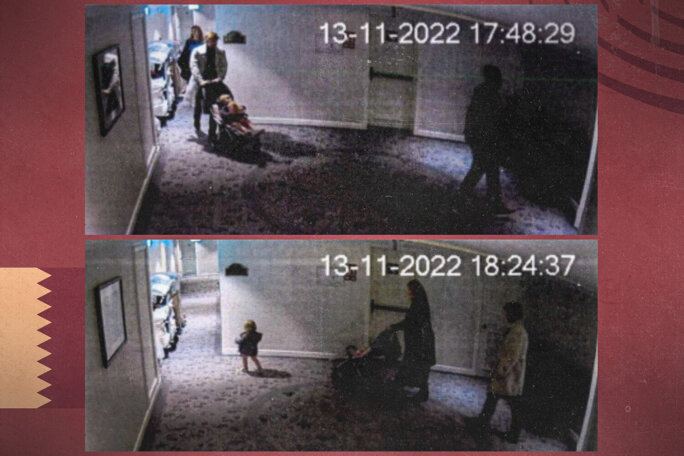
Enlargement : Illustration 9

The day before, Francesco Giorgio and his partner Eva Kaili met the minister in secret at the Steigenberger Wiltcher's luxury hotel in Brussels. CCTV footage shows them entering suite 412 with their 18-month-old child in a pushchair. A quarter of an hour after they left, Giorgio returned for a second meeting with al-Marri, this time accompanied by Antonio Panzeri.
The following day the Qatari minister addressed MEPs on the human rights committee in a meeting which, according to investigators, Antonio Panzeri and his friends had largely scripted from start to finish so that it was as favourable as possible to Qatar.
But problems emerged the following day. On November 15th MEPs raised the idea of voting on a resolution – just before the start of the World Cup there – condemning violations of human rights in Qatar, in particular the plight of migrant workers
5. The assistance of commissioner Schinas
On November 20th 2022 Eva Kaili was invited to Qatar, all expenses paid, to attend the opening match of the World Cup. It was not an official trip: she told detectives that she went as a guest “in a personal capacity” of FIFA president Gianni Infantino, which FIFA has confirmed to the EIC. The Parliament's vice-president did not declare this trip to the Parliamentary authorities, although she was obliged to do so.
The Greek MEP was not there to relax. Panzeri and Giorgio had given her a task: to patch things up with their client Dr Ali al-Marri, with whom they had just become embroiled in a row (see panel below).
And Eva Kaili had an even more important target: Margaritis Schinas, vice-president of the Commission in charge of “promoting the European way of life”, and senior in the hierarchy to home affairs and migration Commissioner Ylva Johansson. Margaritis Schinas had also been in Qatar to attend the match.
Qatar was counting on the Commission vice-president to solve a major problem. When the European Council had approved the visa waiver project it introduced an amendment which meant that the measure would only come into force when the ETIAS system was operational.
ETIAS is an electronic system for handling entry into the Schengen zone of citizens who do not require a visa. It will allow automatic checks to be carried out (on criminal records etc) which is not the case today. “The Council requested this ETIAS condition for security reasons, because Qatar is suspected of being close to radical Islamist movements,” an informed source told the EIC.
The Emirate wanted to kill this amendment which would have delayed the visa waiver for Qataris for several years (ETIAS is still not operational). If this amendment were to be approved by the European Parliament, then the outcome would rest on the 'trilogue', the final legislative negotiations that take between the Parliament, the Commission and the Council.
While in Doha on November 20th for the opening ceremony of the World Cup, Eva Kaili raised the issue of visas with Margaritis Schinas. They then met Dr Ali al-Marri and the Qatari foreign minister – whether together or separately is not known.
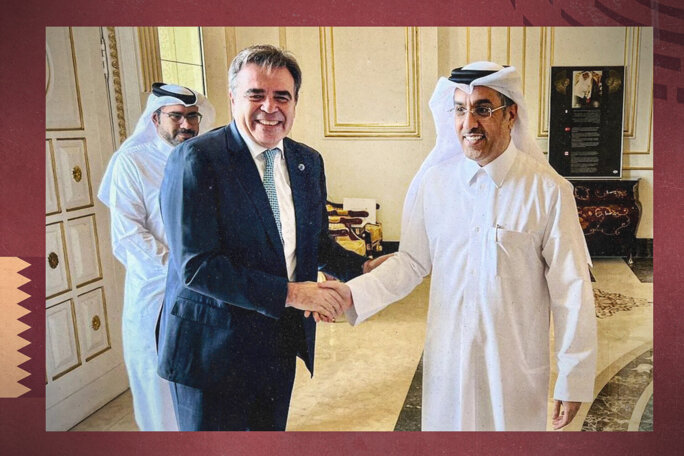
Enlargement : Illustration 10

At 5.39 am, shortly before these meetings, Eva Kaili wrote to an advisor to al-Marri announcing that “the Minister of Foreign Affairs is happy”. She said: “ VP Schinas can be the one to negotiate the Visa. So ask him to be there at the trilogues. To completely stop ETIAS. […] Instead of Ylva Johanson (the other commissioner)”.
At 10 am Eva Kaili's companion, Francesco Giorgi, delivered exactly the same message to the labour minister's top aide, with this additional detail: Margaritis Schinas, he said, was the “only one who can cope with the strong pressure from the Council on ETIAS”.
In simple terms, the vice-president of the European Commission seems to have agreed to replace his subordinate, the commissioner in charge of migration visas, during a crucial negotiation, in order to serve Qatar's interests.
Asked by EIC about this, he did not confirm or deny this. “There was never discussion amongst Commissioners on the issue of the Commission’s representation in trilogues,” regarding the visas, said his spokesperson.
During his trip to Doha Margaritis Schinas posted two enthusiastic Tweets, praising Qatar's “considerable progress” in labour legislation and his “constructive” meetings with the two Qatari ministers. He had previously posted three Tweets in the spring of 2022 praising the visa waiver project.
By coincidence, in their accounts of the operation, Giorgi and Panzeri stated that they had managed to lobby Schinas on the issue three times in 2020 and 2021, via “trusted advisors”.
“Vice-President Schinas does not know and has never met either Mr Panzeri or Mr Giorgi,” his spokesperson said.
6 Infantino, Le Graët and lobbying the Élysée
On the evening of November 20th Eva Kaili attended the opening match of the World Cup in the “VVIP” box reserved for the most senior figures. Clearly enthralled, she wrote in a note found on her phone how she was able to talk with the Emir of Qatar, Tamim bin Hamad Al Thani, the Saudi Crown Prince Mohammed bin Salman, the former football star David Beckham and the Crown Prince of Jordan Al Hussein bin Abdullah.
After the match a dinner was organised in one of the hotels where the FIFA delegation was staying. Gianni Infantino dined with the president of the French Football Federation (FFF) Noël Le Graet and two of his staff.
Eva Kaili joined them and asked them to intervene with French president Emmanuel Macron and get him to ask his party's MEPs to change their position and vote against the resolution condemning Qatar.
“I spent 2 hours with Infantino … the president of the French cup [editor's note, in fact, the FFF] and 2 French trying to stop tomorrow Loiseau speech and call for resolution. I drove them crazy,” said Eva Kaili in her note, who was referring to the head of Macron's group of MEPs Nathalie Loiseau.
According to the EIC's information, Noël Le Graët agreed to deal with the issue, and handed the task to Erwan Le Prévost, the FFF's director of institutional affairs and international relations, who was also at the dinner. “I was asked to inform the Élysée of Madame Kaili's position,” Le Prévost confirmed to Mediapart. When approached, Noël Le Graët denied talking with Eva Kaili that evening.
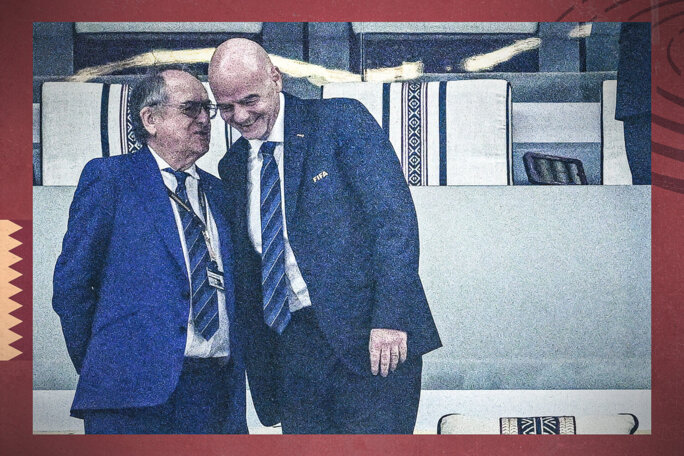
Enlargement : Illustration 11

The following day, November 21st 2022, Eva Kaili was on her way back to Strasbourg for the debate on the resolution concerning Qatar. In the debating chamber she made a plea on behalf of the Gulf state. “They've already accomplished the impossible,” she declared.
But the European Parliament backed the principle of having a vote on the resolution against Qatar, which was to be voted on three days later, November 24th. “Renew is killing us,” Eva Kaili complained to an MEP, referring to the European Parliamentary group Renew, which includes French MEPs from Macron's party.
At 12.59pm on November 23rd, the day before the vote, Erwan Le Prévost asked Eva Kaili for the text of the resolution. At 4.24pm the FFF executive sent the Parliament's vice-president a message in English. “I'm going to have a strong phone call with Macron's SG [editor's note, the acronym for secretary-general, the president's chief of staff] in 15 minutes. What should I ask him about the text?”
Eva Kaili wanted the Élysée to pass on the following instructions to its group of French MEPs: vote for the resolution but reject paragraph A of the text, which criticised the plight of “migrant workers” and the fact that Qatar obtained the World Cup “in a context of credible allegations of bribery and corruption”.
Erwan Le Prévost says that what he did was not lobbying but simply passing on information. He said he had not contacted the secretary-general but instead Emmanuel Macron's advisor on sport Cyril Mourin. “He replied that this channel was not the appropriate one, that the diplomatic channel was the normal route. As far as I am aware it did not go any further,” Erwan Le Prévost said.
The attempt at putting pressure on the Élysée clearly did not work. “I was never contacted by the Élysée or by a French minister about Qatar during this period,” Nathalie Loiseau confirmed to Mediapart.
However, she does recall Eva Kaili sending her “ten or so WhatsApp messages” to criticise her support for the resolution. Nathalie Loiseau said: “She basically said to me 'What an idea, I don't understand, Qatar is exemplary in the region'. Then she told me that the problem concerning labour law didn't come from Qatar but from the companies, and that if one was really intent on giving visibility to the issue then perhaps there would be French companies that would get exposed. It came across as a bit of a threat,” said the French MEP.
Eva Kaili’s phone messages show that she was following instructions from Qatar's ambassador to the EU. “Hi Eva. Please do your best to remove this [the resolution]. I received a phone call from the Palace. They are very angry about this, FIFA and Qatar. I am counting on you to call Roberta Metsola,” Abdulaziz al-Malki wrote to her on November 23rd at 4.02pm.
Eva Kaili had already anticipated the ambassador’s wishes, writing to the President of the European Parliament an hour earlier. But she later deleted all the messages in the conversation, except one: “The rest I disagree too but I believe they will digest if we get the visa,” she told Metsola.
The Qatari ambassador kept up the pressure on November 24th, the day of the vote on the resolution. “Hi Eva. My dear, […] My government doesn't want paragraph A above by all means. Please take it out via voting please,” Abdulaziz al-Malki wrote. Eva Kaili later deleted her response, but she seems to have agreed. “Thank you, your excellency,” replied the ambassador.
The European Parliament's Greek vice-president did all she could, trying to convince several fellow MEPs. But her efforts were in vain. The Parliament approved the resolution including paragraph A, with the support of the Renew group and its MEPs from Emmanuel Macron's ruling party.
Questioned by detectives, Eva Kaili replied that she had “voted for the resolution against Qatar” which she thought was “very good”. This statement is something of an exaggeration. As revealed by Le Monde, Eva Kaili only voted in favour of the paragraphs favorable to Qatar – she abstained from voting against the critical ones.
7. Battle to save the Qatari visas
The main battle, on the issue of visas, still continued. First of all the text had to be adopted by the LIBE committee on Civil Liberties, Justice and Home Affairs before a second vote in a plenary session. “This is the most important thing,” Eva Kaili wrote to the director of institutional relations at the FFF, Erwan Le Prévost, on November 23rd, asking him to pass a message on to the Élysée: they had to “support the visa vote next week”.
The next day, the Qatari ambassador in Brussels put more pressure on the Parliament's vice-president on the visa issue. “That will ease the pressure on us after this resolution today. I count on you my dear Eva,” he wrote.
But two big problems emerged as the end of the process approached.
On November 16th Kuwait executed seven prisoners who had been condemned to death … just as Margaritis Schinas, vice-president of the European Commission and in charge of the visa dossier, was visiting the country. “We will draw all the consequences,” reacted Schinas in an angry tweet.
As far as Qatar was concerned this was a catastrophe. As the visa issue was a 'package' deal involving several countries, it was difficult to remove Kuwait from it without killing off the entire text.

Enlargement : Illustration 12

The Emirate put pressure on its agents Antonio Panzeri and Francesco Giorgio. Eva Kaili reassured her partner. “Qatar must stay calm,” she wrote to him, saying that she was going to call an influential MEP.
The Greek MEP and vice-president of the Parliament then began a frenzied lobbying of the rapporteur in charge of the text and the 'shadow rapporteurs', the MEPs in the various political groups responsible for the text. “We must not punish Oman and Qatar for what Kuwait did,” she pleaded.
Thanks to her discussions the vice-president finally found a solution. Kuwait's name would stay in the text but it would be granted a visa waiver only once it adopted a moratorium on the death penalty.
The second hurdle came, once again, from the Renew group of MEPs. It tabled amendments seeking to introduce into the text a change already adopted by the European Council: to agree the visa exemption only when the ETIAS system was operational. That meant Qatar having to wait several years.
Eva Kaili resumed the fight. She sought a meeting with Swedish MEP Abir Al Sahlani, who was in charge of the text for the Renew group, saying she wanted to speak to her about child victims of repression in Iran. “For 25 minutes, Eva Kaili talked only about Qatar and why that country should have visa liberalization,” the MEP said on Twitter, as reported by Politico. “I got really annoyed. The whole meeting was just an ambush, to try to help the Qatari regime.”
On November 30th, the day before the vote, Eva Kaili, who sat with the Socialists and Democrats (S&D) group in the Parliament, turned her attention to the Spanish MEP Javier Zarzalejos, who was responsible for the text for the centre-right EPP group. “We need to stick to the line and definitely reject, as suggested, the Renew amendments” which introduced the ETIAS condition, she wrote. “We will reject them all. I am in charge of EPP voting list. I'll do that,” agreed Zarzalejos.
On December 1st, the day of the vote by the committee on Civil Liberties, Justice and Home Affairs (LIBE), Kaili rounded up the troops from the S&D group to attend. She even went herself, despite not being a member of the committee, just in case an absent member had to be replaced. When the vote took place there was one too many cast by the S&D group – it was that of Kaili, and as a result, an MEP had to withdraw their voting card. But the proposed text was adopted, mainly thanks to the votes in favour from the S&D and the EPP groups (the Renew MEPs voted against).
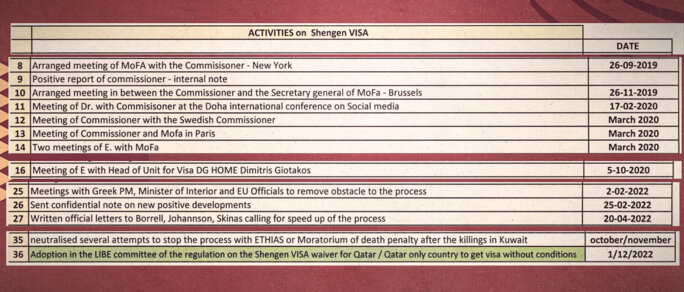
Enlargement : Illustration 13

Antonio Panzeri and Francesco Giorgi claimed the credit for Kaili’s actions in obtaining the vote in favour. In a note sent to the Qataris, they wrote: “[We] neutralized several attempts to stop the process, with the ETIAS and the moratorium on the death penalty after the executions in Kuwait.”
When questioned by police, Kaili formally denied that her actions were guided by the duo. “They asked for information, but it is [me] who asked for their advice,” she said. […] They have a good understanding of the Middle East and North Africa region. […] My speciality is technology, and I don’t know the cartography of the region well enough.”
She said that she had followed the official line of the European Union and that what happened in November 2022, with the resolution against Qatar and the visa issue, was simply a chance occurrence; that at that moment “my mission, European policy and what interested Panzeri coincided”.
Cash, scandal and a freeze on suspect draft legislation
Four years earlier, Panzeri and Giorgi had promised their Qatari client that the exemption from visa requirements would be gained by the time the World Cup came about. Indeed, the definitive vote in a plenary session of Parliament was due on December 13th 2022, five days before the final of the World Cup.
But on December 9th, Panzeri and Giorgi, along with Kaili, were arrested by the Belgian authorities, exposing a vast scandal. On December 12th, Kaili was stripped of her post as the European Parliament’s vice-president. Three days later, MEPs approved a resolution for the suspension of all work on legislative texts that may have been tainted by the suspected corruption, including that concerning the visas. The freezing of the work still applies today.
As a defence strategy, Kaili chose to attack the Belgian magistrates in charge of the investigation, and dubbed the case “BelgianGate” (sic). For Kaili, the real scandal is what she claims has been her mistreatment by the Belgian justice system, which she has accused of being biased against her and of piling pressure on her and her partner. In September she made a formal legal application to have the case against her dropped, arguing that her parliamentary immunity was removed in an illegal manner.
Kaili also faces a separate investigation by the European Public Prosecutor’s Office (EPPO), an independent EU body, which suspects that she has been involved in misappropriation of European Parliament funds between 2014 and 2020.
In a document summarising the suspected wrongdoing and which Mediapart has seen, the EPPO writes that Kaili allegedly asked her parliamentary assistants to carry out fictitious missions, and to submit false documents and “inadmissible” requests for refunds. The EPPO also suspects that her assistants handed her a part of their salaries, and also reimbursements they received for expenses.
In January this year, the EPPO applied for her parliamentary immunity to be removed for its investigations, but because Eva Kaili appealed, the chamber has still not reached a decision on the issue.
Kaili denies the alleged wrongdoing.
--------------------------------------------------
- The original French version of this investigation can be found here.
English version by Michael Streeter and Graham Tearse


